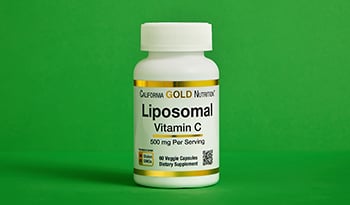A Quick Guide to Liposomal Vitamin C
DISCLAIMER:This blog does not intend to provide diagnosis...

What is Liposomal Vitamin C?
Liposomal vitamin C is an advanced form designed for better absorption and utilization within the body. Liposomes are small spherical cells that are composed of an outer layer made of fatty acids known as phospholipids derived from either sunflower or soy. Liposomes also have an inner compartment composed of water and water-soluble active ingredients. The water-soluble ingredient like vitamin C is protected within the inner compartment by the liposomal structure.
The primary advantage of liposomal vitamin C is improved absorption. The ability of our intestinal cells to uptake higher dosages of vitamin C has a threshold. That is why higher dosages of vitamin C can cause excessive gas and/or diarrhea. The bioavailability of liposomal vitamin C is significantly greater than regular vitamin C, it is taken up into the body at almost double the level that of regular vitamin C. Liposomal vitamin C is often promoted as an oral alternative to getting an intravenous (IV) dosage of vitamin C.
Health Benefits of Liposomal Vitamin C
The health benefits of liposomal vitamin C mirror those of regular vitamin C. The primary function of vitamin C is the manufacture of collagen, the main protein substance of the human body. Since collagen is such an important protein for the structures that hold our body together (connective tissue, cartilage, tendons, etc.), vitamin C is vital for wound repair, healthy gums, and the prevention easy bruising.
In addition to its role in collagen metabolism, vitamin C is also critical to the antioxidant system, immune function, the manufacture of brain chemicals and hormones, and the absorption and utilization of other nutritional factors.
There have been a number of scientific investigations with liposomal vitamin C. In one interesting trial, liposomal vitamin C was shown to prevent reperfusion injury - tissue damage caused when blood supply returns to the tissue after a period of a lack of oxygen. Reperfusion injury is a concern with many heart and cardiovascular procedures and occurs after a heart attack or stroke. Intravenous vitamin C also prevents to prevent reperfusion injury, vitamin C is given intravenously, but since liposomal vitamin C has such a high absorption rate, it is an oral alternative.
In the study, on 4 separate randomly ordered occasions, 11 men and women were administered an oral placebo, or 4 g of vitamin C via oral, oral liposomal, or intravenous delivery. The data indicate that oral delivery of 4 g of vitamin C encapsulated in liposomes produces circulating concentrations of vitamin C that are greater than regular vitamin C, but less than IV administration. Yet, the protection from ischemia–reperfusion-mediated oxidative stress is similar to the protection provided by intravenous administration.
One of the primary uses of high IV doses of vitamin C is in improving the quality of life in cancer patients. Since liposomal vitamin C has higher bioavailability, it may be a great alternative to IV administration.
Another popular use of liposomal vitamin C is the common cold. It has been over 40 years since Linus Pauling wrote the book, Vitamin C and the Common Cold. Dr. Pauling based his opinion on several studies that showed vitamin C was very effective in reducing the severity of symptoms, as well as the duration of the common cold. There are now over 30 clinical trials involving 11,350 study participants designed to judge the effectiveness of vitamin C in the prevention or treatment of the common cold. While the results from individual studies may be mixed, when the results from higher quality studies are pooled researchers have concluded that vitamin C can be quite beneficial in reducing the risk of developing a cold. This conclusion especially applies to individuals in high-stress situations.
Sunflower Derived Phospholipid
The best carrier for liposomal vitamin C is phosphatidylcholine (PC), a key component of lecithin. PC helps to hold the liposomes together. Ideal ranges should be between 250-500 mg of PC per dose in a liposomal vitamin C formula. The PC has its own set of health benefits. The most common sources of the PC are soy lecithin and sunflower lecithin. Sunflower may be the best choice as it removes the GMO issue and also produces a more stable liposome. If soy lecithin is used it should be from a non-GMO source.
Liposomal Quality
In order to produce the results, the liposome must be manufactured properly. The correct size should be between 100 to 400 nanometers in size and the liposome be quality tested at an FDA regulated facility to for quality control.
Homemade Liposomal Products
There is a lot of promotion on the Internet to make your own vitamin C. However, the process of basically just mixing vitamin C powder, vodka, lecithin, and water in a blender and whip it up to make a liposomal mixture is not going to produce the necessary quality of liposome to be an effective carrier for vitamin C.
Dosage
The RDI for vitamin C is 90 mg/day in adult men and 75mg/day in adult women with a suggested upper limit of 2,000 mg/day. Liposomal vitamin C, due to its enhanced absorption is suitable for daily use as well as for specific indications.
Safety and Side Effects
In general, the same concerns with regular vitamin C also apply to liposomal vitamin C. Both are very well tolerated, but liposomal vitamin C will not lead to gas, bloating or diarrhea even at higher dosages. Dosages of vitamin C greater than 2,000 mg are associated with a higher risk for kidney stones.

 By Dr. Michael Murray, N.D.
By Dr. Michael Murray, N.D. 


